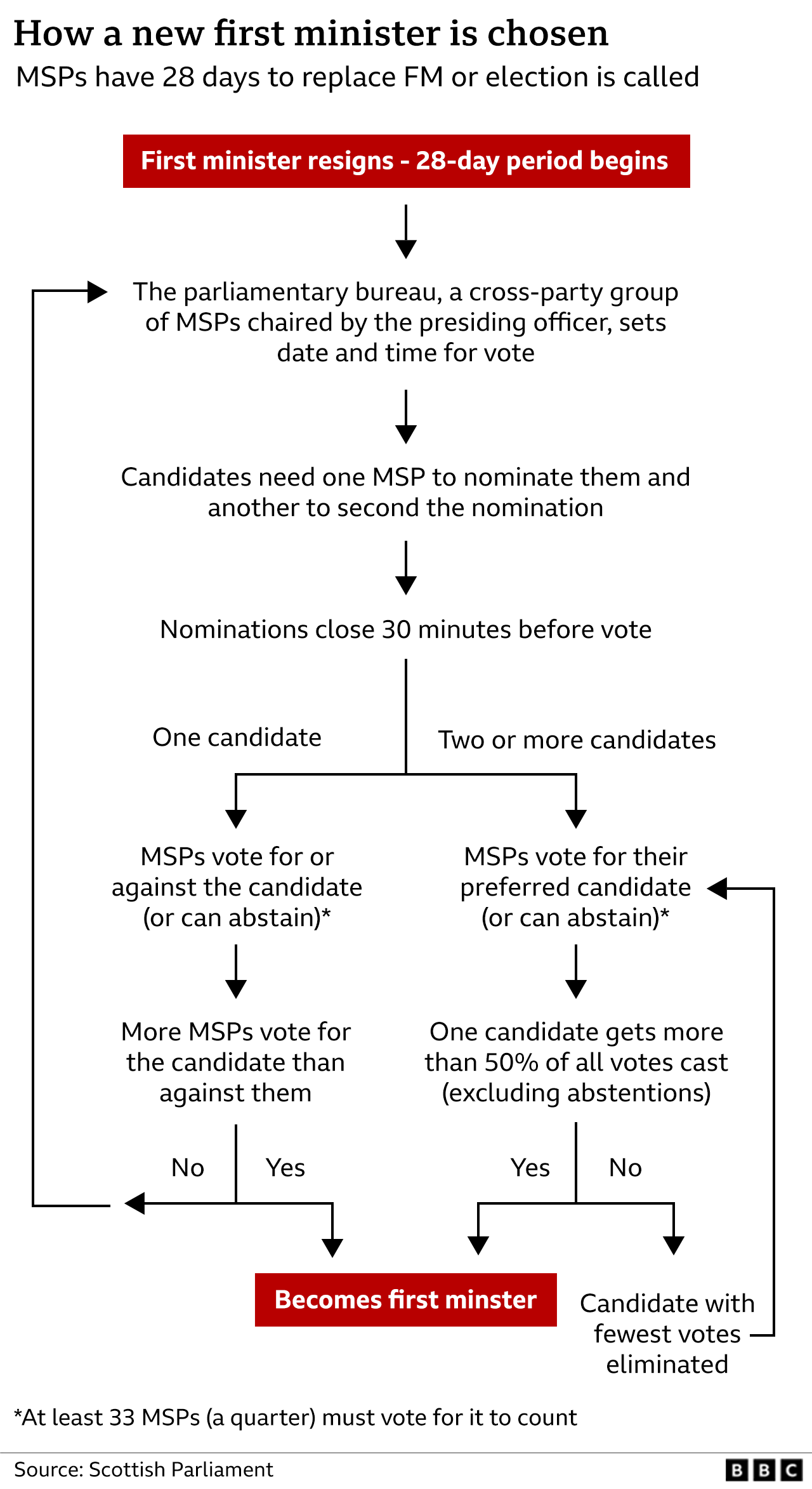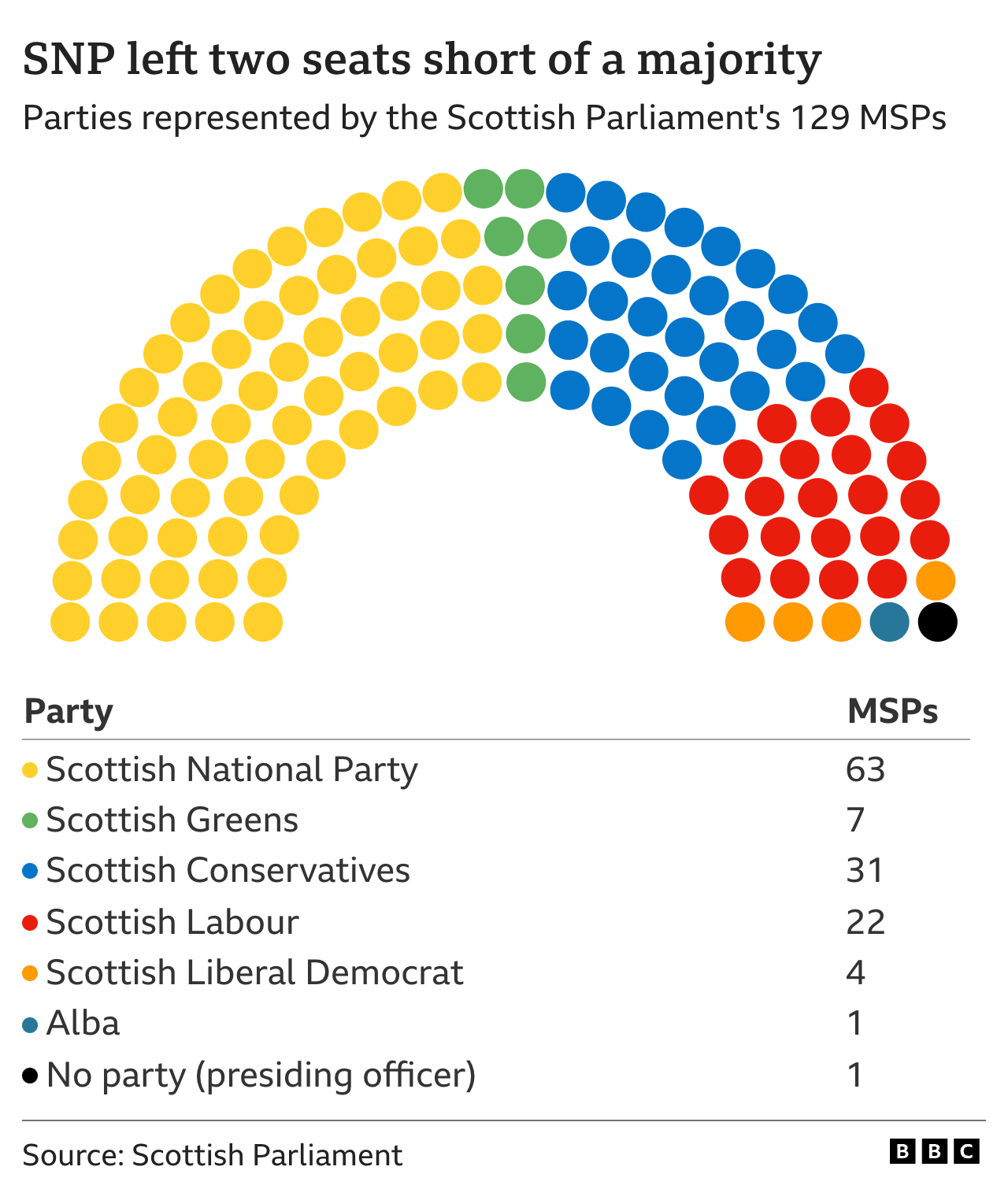This video can not be played
To play this video you need to enable JavaScript in your browser.
The contest to become Scotland's seventh first minister is beginning after Humza Yousaf announced he is to resign.
The embattled SNP leader, under threat from two motions of no confidence in the Scottish Parliament, confirmed his decision in a statement at Bute House.
It followed the collapse of a power-sharing agreement with the Scottish Greens.
Mr Yousaf said he intended to remain as first minister until a new SNP leader is chosen, as was the case when his predecessor Nicola Sturgeon stepped down last year.
How will the SNP choose a new leader?
It is expected that the process will be similar to the one which followed Ms Sturgeon's resignation.
Candidates were required to get 100 nominations from at least 20 local party branches.
If more than one candidate meets that test, there will be a leadership contest.
SNP national secretary Lorna Finn confirmed nominations opened on Monday at 23:59 and would close next Monday at noon.
The next stage is expected to be a ballot by members using a single transferable vote system. Last time round the contest took about a month to complete, before parliament confirmed Mr Yousaf as the nomination to become first minister.
The next SNP leader would then need to seek parliamentary approval to succeed Mr Yousaf as first minister.
How is a new first minister selected?
The parliament has 28 days to nominate a replacement for Mr Yousaf once his resignation has been accepted by the King.
As Mr Yousaf has decided to continue as first minister until a new party leader is selected, the clock will not start until his successor is appointed by the SNP.
If there was only one candidate for the parliamentary nomination, they would only need a simple majority of votes in favour to secure the nomination.
The leaders from other political parties can also put themselves forward. If that happens, as was the case when Mr Yousaf was confirmed as first minister last year, any candidate that secured more than half of all votes would win the nomination.
If no-one reached that threshold, the candidate with the fewest votes would be eliminated. This process would be repeated until the field was whittled down to two.
At that point, a candidate would only require a simple majority to win the nomination, meaning they only have to gain more votes than their opponent.

Any MSP can nominate a candidate, although it must be seconded by another member. Opposition parties usually field their own leaders as alternative candidates to be first minister, though they do not expect their person to win.
Whoever wins the vote is then formally appointed by the King.
However, should the parliament fail to agree a nomination for first minister within 28 days, the presiding officer would be required to propose a date for an "extraordinary general election".
Could the whole government resign?
Mr Yousaf had been facing two motions of no confidence this week, one tabled by the Scottish Conservatives in his own leadership as first minister and another from Scottish Labour on the government as a whole.
The timing of the votes had not yet been announced by parliament.
Scottish Conservative leader Douglas Ross told BBC News that Mr Yousaf should have quit with immediate effect and that his party's motion of no confidence could still go ahead despite his Bute House announcement.
Scottish Labour leader Anas Sarwar said his party would push ahead with its motion of no confidence in the government.
If it passed, government ministers would be obliged to stand down. Only a simple majority would be required, meaning the number of members voting for would have to be greater than those opposed.

The parliament would then have 28 days to choose a nominee for first minister. If it was unable to do so, the parliament would be dissolved for an election.
The SNP currently have 63 MSPs, meaning they could be defeated if all MSPs from other parties voted against them.
However, BBC News understands that the Greens, who have seven seats, will not support either of the no-confidence motions following Mr Yousaf's statement.
Green co-leader Patrick Harvie said: "The Scottish Greens have a long track record of working constructively from opposition and will do so with any first minister who shares our progressive values and who can secure our confidence."
When it was put to Mr Sarwar that Labour's no-confidence motion in the government was likely to fail without Green support, he told BBC Radio's Good Morning Scotland: "It's of course for other political parties to decide how they vote in that motion, but I think the principle still applies in our motion and that's why we're pushing ahead."
https://news.google.com/rss/articles/CBMiL2h0dHBzOi8vd3d3LmJiYy5jby51ay9uZXdzL3VrLXNjb3RsYW5kLTY4OTE5OTk20gEzaHR0cHM6Ly93d3cuYmJjLmNvLnVrL25ld3MvdWstc2NvdGxhbmQtNjg5MTk5OTYuYW1w?oc=5
2024-04-30 07:16:57Z
CBMiL2h0dHBzOi8vd3d3LmJiYy5jby51ay9uZXdzL3VrLXNjb3RsYW5kLTY4OTE5OTk20gEzaHR0cHM6Ly93d3cuYmJjLmNvLnVrL25ld3MvdWstc2NvdGxhbmQtNjg5MTk5OTYuYW1w
Tidak ada komentar:
Posting Komentar